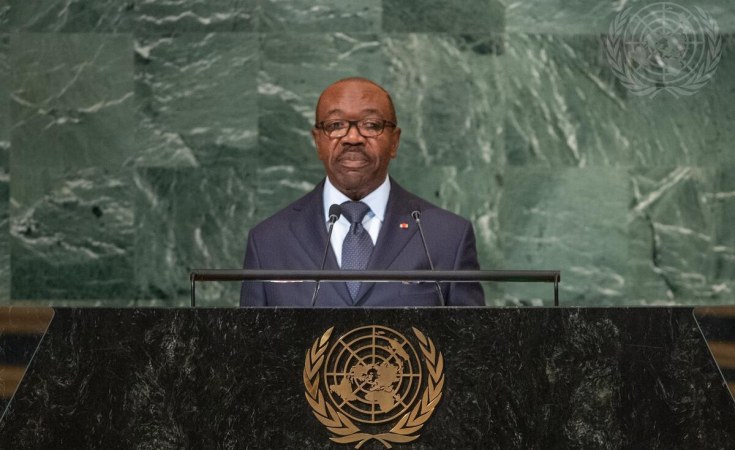Washington — Experts say it is unlikely that regional leaders in Central Africa and the international community will be enthusiastic in calling for the reinstatement of deposed Gabon leader Ali Bongo Ondimba.
Gabon's military leaders announced Bongo's release from house arrest Thursday, following an apparent coup on August 30. State-run media showed Bongo greeting officials as the military leaders announced that he was "free to travel" abroad.
On the same day, Gabon's military leaders appointed Raymond Ndong Sima, an outspoken critic of the former president and a former opposition leader who ran against Bongo in this year's elections, as interim prime minister. Sima, 68, is an economist who previously served as Bongo's prime minister from 2012 to 2014.
Less than a week after the coup, the military leaders, calling themselves the Committee for the Transition and Restoration of Institutions, named General Brice Oligui Nguema, commander-in-chief of the Gabonese Republican Guard, as transitional head of state.
David Otto-Endeley, director of the Geneva Center for African Security and Strategic Studies, said that reactions to the leadership appointment from the regional bloc, the Economic Community of Central African States (ECCAS), might go only as far as a condemnation.
ECCAS criticized the military's move a day after the coup, saying in a statement that it planned an "imminent" meeting of heads of state to determine how to respond. The regional bloc did not give a date.
"I think there's no general desire in a democratic era to see leaders who run in perpetuity in power. This is more or less a dynasty" within "some kind of democratic institution," Otto-Endeley told VOA's English to Africa Service. "The international community will be a lot more careful as compared to countries like Niger, where it was clearly a democratically elected president that was overthrown.
"Gabon has been seen as some kind of a handover -- from father to son and son to father."
He said a rule introduced in July, less than two months before Gabon's national elections, put the main opposition candidates -- the Alternance 2023 alliance -- at a "disadvantage" because it had not fielded candidates for parliamentary elections.
Otto-Endeley also noted that Saturday's internet shutdown and a curfew in the aftermath of the election gave troubling signals.
"I think the signs were clearly written on the wall," he said. "We're experiencing another coup pandemic. It's a replica of what we've experienced lately in Niger, Burkina Faso, Mali, Guinea and Sudan, but this time, the dynamics are quite different."
End of dynastic rule
Otto-Endeley said he thought the Bongo dynasty, which has ruled the Central African state since 1967, coupled with the country's lack of constitutional term limits, validated theories that Ali Bongo "had this coming."
"The military has been used for regime protection in most of the dynasties that have stayed for long. And now, the military is seeing itself as the only hope that can liberate the country from this dynasty rule," he said. "It seems the beast that the government has been using to attack the population is now eating its owners."
Maja Bovcon, senior Africa analyst at the London-based risk intelligence company Verisk Maplecroft, agreed that there was no interest on the global community's part in seeking a return of Bongo to power.
"The international community and regional bodies are unlikely to go beyond condemning the coup and demanding the restoration of civilian rule," she told VOA. "They are aware of the lack of public support for President Ali Bongo and the contentious conditions in which the latest elections were conducted."
Bovcon said that "the putsch in Gabon, along with the spate of coups across the region, will put long-serving autocratic leaders on alert."
Cameroonian President Paul Biya and his Rwandan counterpart, Paul Kagame, have reportedly reshuffled their military's leadership since Gabon's coup. It is not clear whether the changes were connected to the developments in Gabon.
Andrea Ngombet, founder of the Paris-based Sassoufit Collective, an organization that promotes democracy, human rights and anti-corruption efforts across the continent, told VOA that at the heart of the military takeover in Gabon was the desire to quash the "dynastic reign of the Bongo family."
He said the coup was a message to multinational companies and international partners who operate in the country that they "cannot continue to do business as usual," adding that if global condemnation against the military takeover wasn't measured, there would be a risk of driving the Gabonese people to foreign powers like Russia and China.
"If we condemn the coup -- just because it is a coup -- we will push [the Gabonese people] away to the likes of the Wagner mercenary group, Russia and China," he told VOA, because the "fundamental needs" of the Gabonese are restoring democracy and sovereignty and securing social and economic justice.
This report originated in VOA's English to Africa Service. English to Africa's Hayde Adams contributed.


